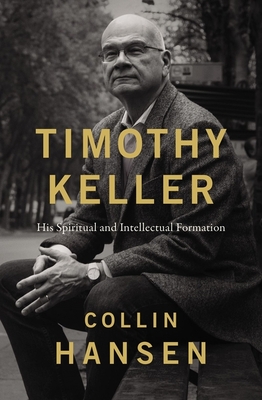Timothy Keller: His Spiritual and Intellectual Formation

Timothy Keller is one of my heroes. As I began to "make my faith my own" midway through undergrad I delved into apologetics and read Keller's 2008 book 'The Reason for God' (which made the Presbyterian pastor a household name in Christian circles). I also discovered his sermons. Tim Keller - along with Darrell Johnson and Jason Byassee - led me to a love and appreciation for sermons that I had never had before. Whereas many expositional preachers focus so closely on the biblical text that they sometimes seem unable to or clunkily apply it to the present day, Keller was able to weave deep scriptural insights together with confident and incisive critiques of modern culture in a way that avoided the fundamentalist fulminations of the Religious Right.
Collin Hansen's biography of Timothy Keller traces the bookish pastor's spiritual and intellectual influences. I learned many new things about Tim's life, such as the fact that his Roman Catholic mother had him baptized in the Catholic Church before she determined that Catholicism did not square with Scripture (p. 4); Tim's family would sojourn with the Lutherans before his mother settled in the Evangelical Congregational Church, a Wesleyan-Arminian denomination. I had always thought Tim came from a more secular background but it seems like he always had Christianity in his life growing up, even if his own deep and sincere conversion experience happened while in undergrad at Bucknell University.In the early days after his "conversion" Tim relied heavily upon InterVarsity Christian Fellowship and would later serve on its staff (this is interesting as IVCF's ethos is more egalitarian and has more of a mixture of Arminian and Reformed theology; Tim would eventually become a complementarian Calvinist). He also gravitated towards British influences such as C.S. Lewis (Tim's wife Kathy wrote to the Oxford professor as a child and recommended Lewis' works) and the "evangelical statesman" John Stott (and isn't Tim Stott's successor?).
Tim and Kathy Kristy attended Gordon-Conwell Theological Seminary. Here they cultivated a romance alongside a rich intellectual life made possible by Gordon-Conwell's theology diversity. Tim established a reputation for being able to "translate" the heady classroom lectures into more understandable lessons for his peers - a skill that continued throughout Tim's life as he copiously quoted and explained the insights of notable scholars like Robert Bellah, Charles Taylor, Alasdair MacIntyre, Jonathan Haidt, and many more during his own teaching ministry (p. 82). He and Kathy also gained valuable, lifelong friends during their seminary years.
Both Tim and Kathy took class with the legendary Elisabeth Elliott whose first husband had been killed by an indigenous tribe in Ecuador; as a widow, Elliott herself later went to the Huaorani tribe to minister to them in an amazing embodiment of forgiveness and reconciliation. Kathy had begun seminary courses intent to be ordained as a PCUSA pastor but through Elisabeth Elliott and other influences Kathy came to adopt the belief that the Bible does not permit the ordination of women.
Tim's theology also sharpened at Gordon-Conwell. Despite a Lutheran and nominal Wesleyan-Arminian church background, Tim came to Calvinist convictions through the influence of professors like William Lane, Richard Lovelace (whose teachings on the history of revival and his book Dynamics of the Spiritual Life would exert a lifelong influence on Tim) and Roger Nicole (Hansen writes of the latter "Nicole has been largely forgotten today, except by his students, because he focused more on classroom teaching than on writing books and journal articles," pp. 88-89). In fact, Hansen notes that by the time Tim graduated from Gordon-Conwell, he had essentially crystalized his lifelong tenets - "Presbyterian-Reformed theology...penal substitution, classic covenant theology, amillennialism," complementarianism, the reality of evolution, and a blend of neo-Calvinism, evangelism, and social justice (p. 103). This is somewhat ironic as Tim counseled pastors-turned-aspiring-authors to wait until they were older before publishing books because then their theology will have had time to be tried and tested but in Tim's case his key dogmatic beliefs appear to have remained fairly static.
Hansen opens up a window into the Kellers' first church in Hopewell, Virginia, where they spent nine years. The novice pastor learned the ropes of church ministry and preached about 1500 sermons by the time he was 34 (p. 127). During this time Tim had a paltry salary so he would ask his family to buy him books for Christmas (p. 123); he especially dug into the Puritans and would find in figures like John Owen, Richard Sibbes, and Thomas Brooks rich resources for personal devotion and pastoral care. It is also comforting to hear that during his Hopewell ministry, Tim played video games, especially Space Invaders - one forgets how old video games are (p. 123)!
The next stage of Tim's career was as a professor of practical theology at Westminster Theological Seminary where he taught alongside Bruce Waltke, Tremper Longman III, and one of his (preaching) heroes, Edmund Clowney. During this time Tim and Kathy continued to serve in ministry even while enjoying a step back from the intensity of vocational pastoral work. Part of this ministry included outreach to those suffering with AIDS and Hansen sheds light on a lesser-known part of Tim's life - that his own brother Billy was a gay man who died of AIDS in 1998 (Hansen writes of this experience movingly and tenderly). Tim earned a D.Min. in 1981 studying under Harvie Conn and focusing on mercy ministries.
After much wrestling the Kellers answered God's call to plant Redeemer Presbyterian Church in New York City in 1989. The last third of this book is dedicated to this era, as Tim, Kathy, and the early members of Redeemer poured out their life in service, mission, and prayer to NYC. Redeemer grew dramatically in attendance, particularly attracting young professionals and Asian Americans like Makoto Fujimura. Tim's sermons interrogated the idols of the secular city and pointed listeners to the beauty and majesty of Jesus Christ. After the devastating attacks of 9/11 hundreds of visitors came to Redeemer to find spiritual solace as they worked through their grief and trauma and they found thoughtfulness, comfort, and guidance in Tim's sermons.
Nearly twenty years after planting Redeemer, Tim also began publishing beloved bestsellers like The Reason for God (2008), The Prodigal God (2008), The Meaning of Marriage (2011), and Center Church (2012). These books, along with the co-founding of The Gospel Coalition by Tim and D.A. Carson made Tim rise to prominence in Christian circles. Hundreds of churches (including my own!) were planted through the direction of Redeemer's City to City church planting initiative.
Hansen begins the postscript of this book writing "I never found a parallel among biographies for this book, which has explored the influences on, more than the influence of, our subject" (p. 269). I don't want to critique Hansen for not writing what he had no intention of writing but I do wish the book had been more comprehensive and detailed. His sons are barely mentioned at all in the book. We learn of Tim's association with R.C. Sproul and his Ligonier Ministries but very little attention is given to The Gospel Coalition - how did Tim become friends with D.A. Carson and John Piper? Why was Redeemer so attractive to Asian-Americans in particular? Did Tim read any Wesleyan-Arminian theologians or egalitarian scholars as he moved towards Calvinism and complementarianism? Hansen opaquely writes "Though Keller didn't engage deeply in the New Perspective debates that raged during the 1990s and 2000s, he observed subtle legalism in alternatives to the Reformers" - is there more of an explanation of this observation (p. 262)? On the one hand, Tim lauded N.T. Wright's The Resurrection of the Son of God but it seems he was also more critical of Wright's views on the New Perspective on Paul - why did Tim avoid the debates and what critique of the New Perspective would he make and what evidence did he see for "subtle legalism? At times like these the book seems a little too scanty and rushed.
And maybe that's because tragically (though it is never really tragic for a follower of Christ), Tim Keller died a few months after this book was published. Hansen has done a marvelous job of interviewing Tim himself, as well as family, friends, and colleagues, to help sketch out Tim's spiritual and intellectual journey. If they hadn't already looked at the endnotes of Tim's books, readers will discover how figures like Martin Luther, George Whitefield, Jonathan Edwards, C.S. Lewis, Geerhardus Vos, Herman Bavinck, and Lesslie Newbigin shaped Tim's thought and ministry. May Tim's legacy inspire and enrich others as he dwells now in the presence of the Lord.


